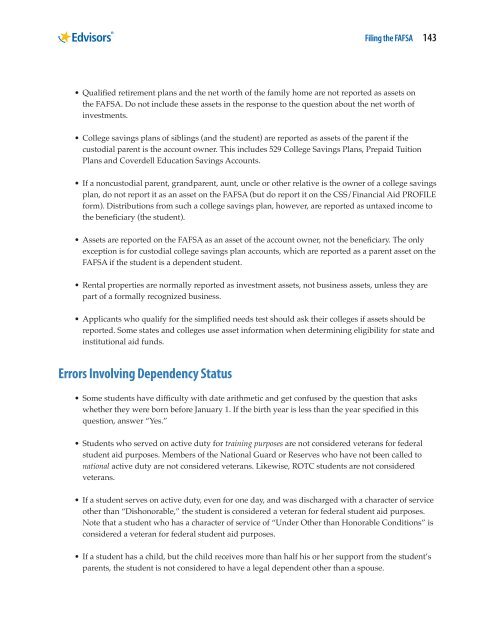filing-the-fafsa-2015-2016-edition
filing-the-fafsa-2015-2016-edition
filing-the-fafsa-2015-2016-edition
You also want an ePaper? Increase the reach of your titles
YUMPU automatically turns print PDFs into web optimized ePapers that Google loves.
Filing <strong>the</strong> FAFSA 143<br />
• Qualified retirement plans and <strong>the</strong> net worth of <strong>the</strong> family home are not reported as assets on<br />
<strong>the</strong> FAFSA. Do not include <strong>the</strong>se assets in <strong>the</strong> response to <strong>the</strong> question about <strong>the</strong> net worth of<br />
investments.<br />
• College savings plans of siblings (and <strong>the</strong> student) are reported as assets of <strong>the</strong> parent if <strong>the</strong><br />
custodial parent is <strong>the</strong> account owner. This includes 529 College Savings Plans, Prepaid Tuition<br />
Plans and Coverdell Education Savings Accounts.<br />
• If a noncustodial parent, grandparent, aunt, uncle or o<strong>the</strong>r relative is <strong>the</strong> owner of a college savings<br />
plan, do not report it as an asset on <strong>the</strong> FAFSA (but do report it on <strong>the</strong> CSS/Financial Aid PROFILE<br />
form). Distributions from such a college savings plan, however, are reported as untaxed income to<br />
<strong>the</strong> beneficiary (<strong>the</strong> student).<br />
• Assets are reported on <strong>the</strong> FAFSA as an asset of <strong>the</strong> account owner, not <strong>the</strong> beneficiary. The only<br />
exception is for custodial college savings plan accounts, which are reported as a parent asset on <strong>the</strong><br />
FAFSA if <strong>the</strong> student is a dependent student.<br />
• Rental properties are normally reported as investment assets, not business assets, unless <strong>the</strong>y are<br />
part of a formally recognized business.<br />
• Applicants who qualify for <strong>the</strong> simplified needs test should ask <strong>the</strong>ir colleges if assets should be<br />
reported. Some states and colleges use asset information when determining eligibility for state and<br />
institutional aid funds.<br />
Errors Involving Dependency Status<br />
• Some students have difficulty with date arithmetic and get confused by <strong>the</strong> question that asks<br />
whe<strong>the</strong>r <strong>the</strong>y were born before January 1. If <strong>the</strong> birth year is less than <strong>the</strong> year specified in this<br />
question, answer “Yes.”<br />
• Students who served on active duty for training purposes are not considered veterans for federal<br />
student aid purposes. Members of <strong>the</strong> National Guard or Reserves who have not been called to<br />
national active duty are not considered veterans. Likewise, ROTC students are not considered<br />
veterans.<br />
• If a student serves on active duty, even for one day, and was discharged with a character of service<br />
o<strong>the</strong>r than “Dishonorable,” <strong>the</strong> student is considered a veteran for federal student aid purposes.<br />
Note that a student who has a character of service of “Under O<strong>the</strong>r than Honorable Conditions” is<br />
considered a veteran for federal student aid purposes.<br />
• If a student has a child, but <strong>the</strong> child receives more than half his or her support from <strong>the</strong> student’s<br />
parents, <strong>the</strong> student is not considered to have a legal dependent o<strong>the</strong>r than a spouse.


